Empowering Autistic Adults in Higher Education
Navigating higher education can present unique challenges and opportunities for autistic adults. With increasing access to college programs, targeted support, and understanding policies, autistic students are gaining the tools they need to thrive academically, socially, and professionally. This guide explores essential supports, resources, and environment modifications designed to foster independence, inclusion, and success for autistic learners in college settings.
Understanding Autism and Its Impact on Postsecondary Education
What is Autism Spectrum Disorder and How Does It Affect College Students?
Autism spectrum disorder (ASD) is a developmental condition that influences communication, social interactions, and sensory processing. Common signs include difficulties in understanding social cues, challenges with verbal and non-verbal communication, and sensory sensitivities such as hypersensitivity or hyposensitivity to light, sound, textures, and other stimuli. Many autistic individuals also experience rigid thinking patterns and face emotional or behavioral reactions like meltdowns or shutdowns when overwhelmed. About 1 in 100 people have autism, making it a relatively common neurodevelopmental condition.
In a college setting, these traits can present specific challenges. Autistic students might struggle with adapting to new routines, navigating social relationships, or handling sensory-rich environments like crowded classrooms or noisy cafeterias. Sensory issues affect approximately 90% of autistic people, influencing their ability to concentrate and participate fully in academic and social activities.
Proportion of Unawareness and Misdiagnosis in the Autistic Population
Despite its prevalence, many autistic individuals are unaware of their diagnosis or have been misdiagnosed. Recognition of autism in adults has been increasing, leading to more accurate diagnoses later in life. This is particularly important in postsecondary education, where unrecognized or misunderstood traits can hinder academic performance and social integration.
Furthermore, autism is highly heterogeneous. Many students with ASD are often characterized by average or above-average intelligence, and they excel in specific areas such as reading or detailed-oriented tasks. Nonetheless, they may still face significant hurdles in social engagement, executive functioning, and sensory regulation.
Strengths and Personalization of Support
Autistic individuals frequently possess strong dependability, high work ethic, and exceptional attention to detail. Recognizing these strengths is crucial for educators and support programs aiming to provide effective assistance.
Given the diversity in presentations, support approaches must be personalized. Adjustment measures in higher education include providing visual supports, creating autism-friendly environments, and fostering structured routines. These strategies have been shown to improve engagement, reduce anxiety, and facilitate academic success.
Resources and Tools for Enhancing College Success
A variety of educational tools are available to aid autistic students, families, and educators in understanding how to foster success in college. Organizations such as the College Autism Network and the Autism Society share resources tailored to this transition. They offer guides, workshops, and online materials that focus on key areas like self-advocacy, navigating accommodations, and building support networks.
Many colleges now provide specialized programs, including sensory rooms, social skills coaching, and transition planning services, often in partnership with autism-focused organizations. Additional formats like books, podcasts, and videos sharing personal stories serve as valuable sources of guidance and inspiration.
Support Strategies in Postsecondary Environments
Facilitating a positive college experience for autistic students involves implementing manageable support strategies, such as:
- Visual schedules and timetables
- Quiet, sensory-friendly spaces
- Social stories and peer mentorship programs
- Clear, explicit instructions and expectations
- Flexibility with rules and deadlines
- Allowing adequate response time and breaks
These adjustments help reduce sensory overload, facilitate learning, and promote social participation. Peer mentorship programs, led by trained students and supervised by professionals, have emerged as promising supports that foster social skills and a sense of belonging.
Legal Frameworks and Accessibility
Postsecondary institutions are governed by laws like the Americans with Disabilities Act (ADA) and Section 504 of the Rehabilitation Act, which mandate reasonable accommodations for students with disabilities, including autism. However, many students find existing accommodations insufficient or not tailored to their needs. Therefore, disclosure and proper documentation are essential for gaining access to these supports.
While IEPs (Individualized Education Programs) do not transfer to college, students can request accommodations such as additional time on tests, note-taking assistance, or specialized seating. Engaging with disability services early helps ensure a smoother transition.
Enhancing Higher Education and Employment Opportunities
Beyond academics, there is growing support for autistic adults in career development and employment. Programs like New Directions or Direction Therapy assess strengths, provide vocational training, and facilitate transition into the workforce. Awareness of employment laws, like the ADA, reinforces the rights of autistic adults in workplace accommodations.
Many universities now host programs specifically geared toward supporting autistic students through social skill workshops, employment preparation, and community engagement initiatives. These resources aim to improve independence and overall quality of life post-graduation.
Resources and Support Networks
Supporting autistic college students involves a comprehensive approach. Support networks through peer mentoring, community groups, and mental health services play an important role in social integration and well-being. Organizations like OAR (Organization for Autism Research) provide extensive resources, including guides on making friends, balancing social and academic life, dating, room-sharing, and understanding autism for faculty and staff.
OAR’s resources also extend to parents, helping them support their young adult’s transition to college and independent living.
Tables: Summary of Supports and Resources for Autistic Postsecondary Students
| Support Type | Examples | Purpose |
|---|---|---|
| Academic Accommodations | Extra time, note-takers, specialized seating | Ensure fair access and reduce academic barriers |
| Environmental Adjustments | Sensory rooms, quiet spaces | Manage sensory sensitivities |
| Social Support | Peer mentorship, social skills groups | Foster social connection and belonging |
| Communication Strategies | Visual supports, scripts, clear instructions | Improve interaction with staff and peers |
| Legal and Advocacy | Disability office, documentation | Secure necessary accommodations |
| Employment Programs | Vocational training, career workshops | Support transition to work life |
| Resources for Families | Transition guides, counseling | Help navigate college challenges |
Autistic students bring valuable strengths and face unique challenges, but with tailored support and understanding, they can achieve academic success and thrive beyond college. Continued development of supportive programs, legal awareness, and inclusive environments remains vital to this goal.
Support Programs and Resources for Autistic Students at College
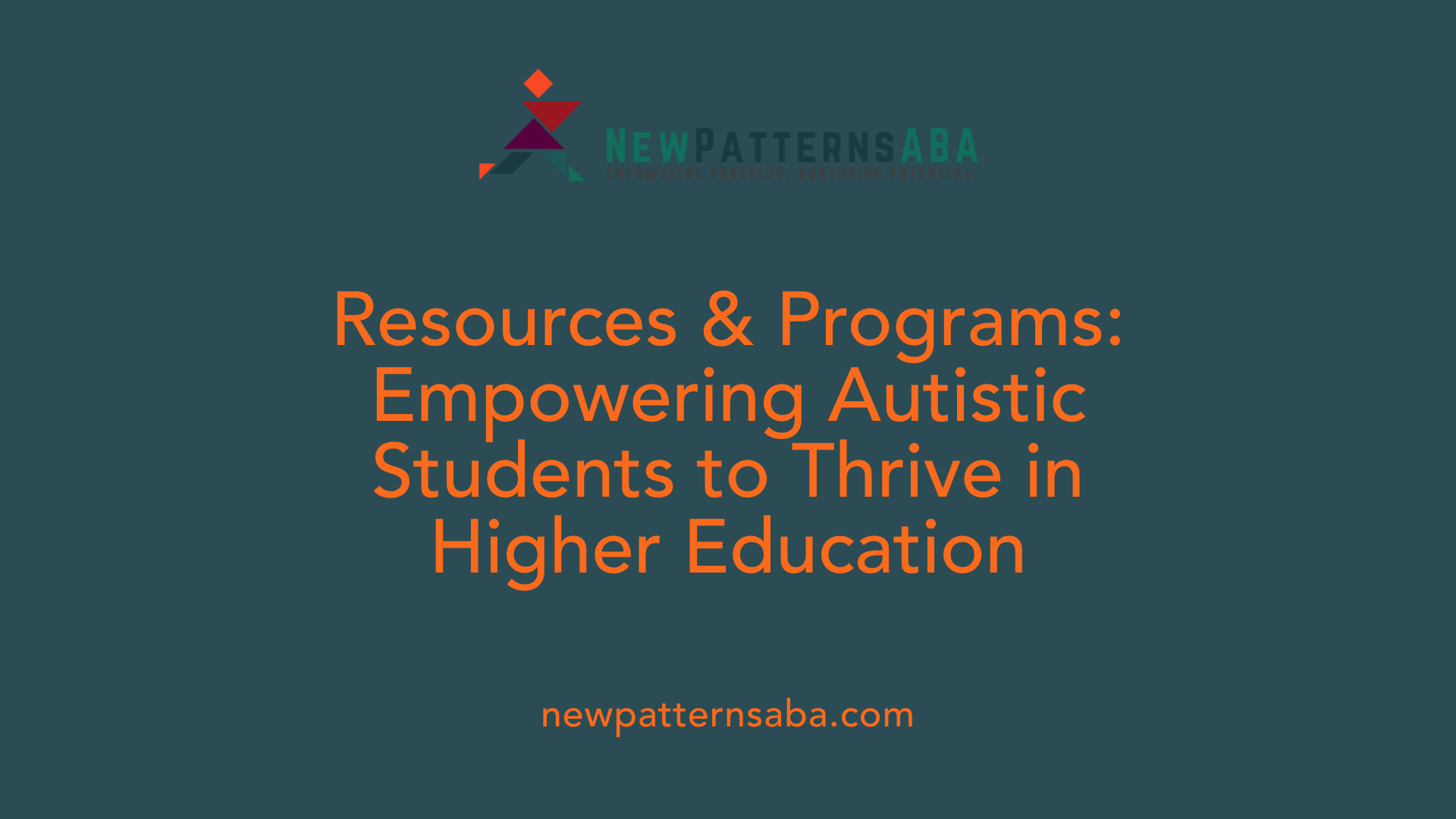
What resources and programs support autistic students in postsecondary education?
Higher education institutions recognize the importance of tailored support for autistic students. Several programs and services are designed to help these students thrive academically and socially.
The Rutgers College Support Program (CSP) is a prominent example, offering comprehensive assistance that includes skills development, social integration, and access to dedicated community spaces. Rutgers often collaborates with specialized centers like the Rutgers Center for Autism and Other Neurodevelopmental Disorders (RCAAS) and the Center for Youth and Special Education Workshop (CYSEW), which enhance support through specialized resources.
Another valuable resource is the College Autism Network (CAN). It serves as a national hub for information, providing a detailed database of autism-specific college programs. CAN offers resources tailored for students, families, educators, and professionals, along with hosting annual summits to promote best practices in supporting autistic learners.
Many colleges also participate in federally supported initiatives designed to provide accommodations such as extended testing and assistive technology. These accommodations are essential for ensuring inclusive learning environments.
In addition to formal accommodations, some colleges offer autism-specific support programs. These include mentoring programs where experienced peers or staff guide students through academic and social challenges, counseling services focused on mental health and adjustment, and social skills training workshops tailored to autistic needs.
While some of these programs may involve additional costs, they aim to foster academic success, improve social inclusion, and prepare students for career transitions. They emphasize customized support plans that address individual strengths and difficulties.
Overall, a mix of campus-based resources, specialized programs, and national networks forms a comprehensive support system. These initiatives work collectively to ensure autistic students have the tools, understanding, and environment necessary to succeed in higher education settings.
| Program/Resource Name | Focus Area | Additional Details |
|---|---|---|
| Rutgers College Support Program | Academic, social, community | Collaborates with RCAAS, CYSEW; provides dedicated spaces |
| College Autism Network | Information, best practices | Database, resources for students, educators, & families |
| Federal Accommodations | Testing, technology | Extended time, assistive tech |
| Mentoring & Social Skills | Peer support, social inclusion | Individual & group mentoring, workshops |
| Counseling Services | Mental health | Supports adjustment, stress management |
Creating supportive environments is crucial for the success of autistic students. With a variety of programs available, colleges continue to improve their inclusivity, fostering environments where autistic individuals can excel academically while developing essential social and life skills.
Support for Academic, Social, and Career Development
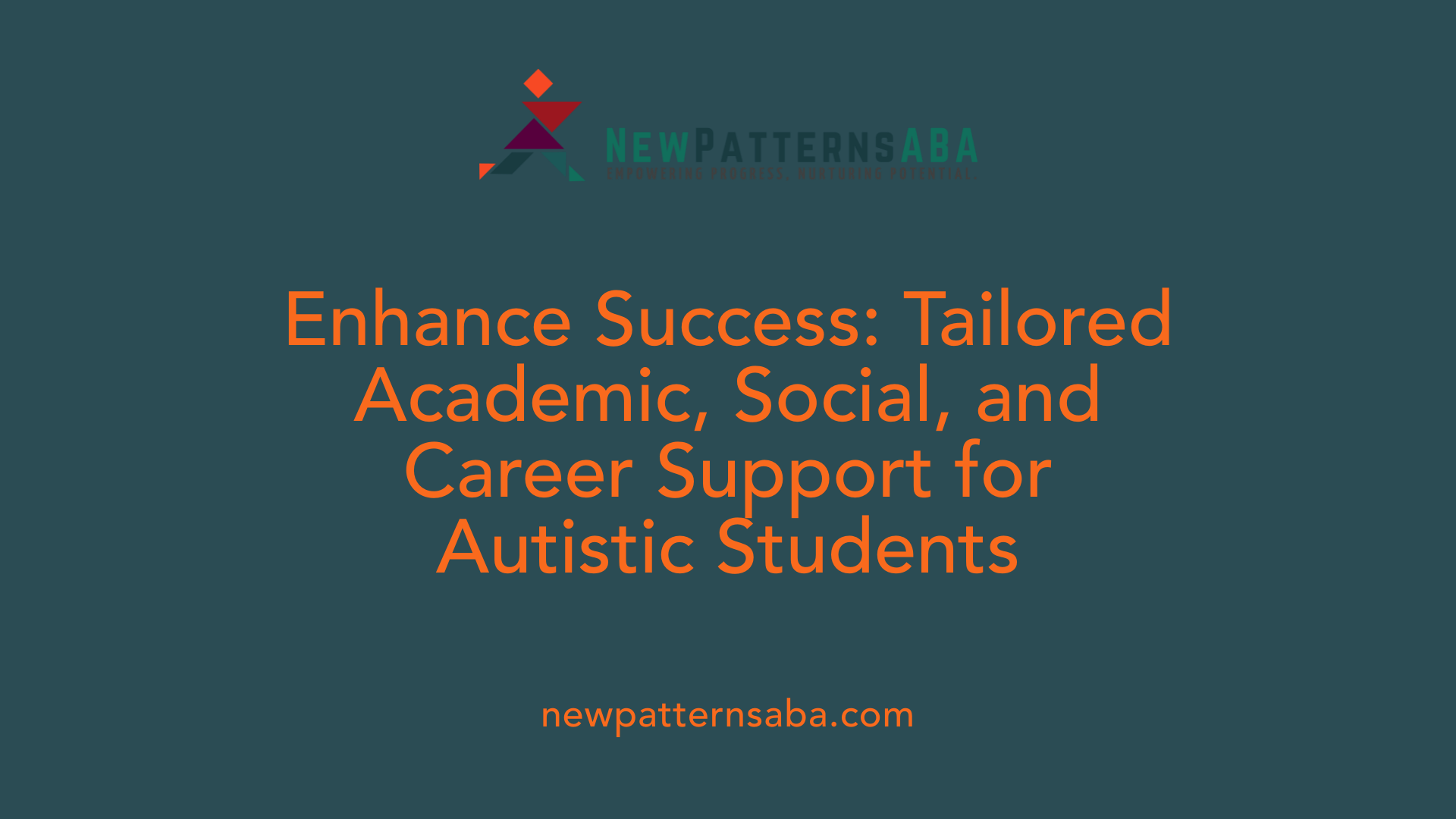
What support is available for autistic students in college regarding academics, social skills, and career development?
Colleges and universities offer a range of resources designed to help autistic students succeed in their academic, social, and career pursuits. Academic accommodations are core to supporting these students, including note-taking assistance, sensory modifications in learning environments, and extended time for tests. These adjustments aim to reduce sensory overload and address executive functioning challenges, making the learning process more accessible.
Beyond academics, fostering social skills and providing mentorship opportunities are crucial. Many institutions implement social skills training programs, peer mentorship, and inclusivity initiatives to help autistic students build meaningful relationships and integrate into campus communities. These programs often involve peer support groups, social story workshops, and activities that promote social understanding and confidence.
Career development support is equally vital. Colleges typically provide career counseling, exploration classes, and specialized empowerment initiatives tailored for autistic students. These services assist students in identifying interests, developing job-ready skills, and navigating employment opportunities. Some programs focus on independence, entrepreneurship, or preparing students for workplace environments, often accompanied by vocational training, mock interviews, and workplace accommodation guidance.
Transition planning from high school plays a strategic role in preparing students for college life. Starting around age 14, students work with educators, counselors, and families to develop self-advocacy skills, understand available supports, and set realistic goals for higher education and future employment.
Institutions also leverage research-backed practices and advocate for inclusive policies through organizations like the College Autism Network. These efforts help shape best practices, inclusive training for staff, and the implementation of supportive policies.
Legal frameworks, including the Americans with Disabilities Act (ADA) and Section 504 of the Rehabilitation Act, ensure that colleges provide individualized accommodations. These laws reinforce the necessity for institutions to tailor supports to each student's needs, ensuring fair and equitable access.
Faculty and staff training is instrumental in creating welcoming environments. Many colleges implement training modules focused on understanding autism, promoting patience, and applying effective teaching strategies—such as clear instructions, visual supports, and flexibility—beneficial for all students.
| Support Type | Description | Additional Details |
|---|---|---|
| Academic Accommodations | Notes assistance, sensory mods, testing extensions | Tailored to reduce sensory and cognitive overload |
| Social Skills Programs | Peer mentoring, social stories, group activities | Fosters social inclusion and confidence |
| Career Support | Counseling, job prep, empowerment programs | Enhances employment readiness and independence |
| Transition Planning | Early planning, self-advocacy skills development | Critical for postsecondary success |
| Policy & Training | Inclusion policies, faculty/staff training | Establish supportive, understanding environments |
Overall, the comprehensive support framework in higher education is designed to empower autistic students, helping them navigate academic challenges, develop social competence, and prepare for meaningful careers. While research continues to evolve, current practices and legal protections contribute to creating more inclusive, understanding, and resource-rich college environments.
Supporting Transitions into Higher Education and Creating Autism-Friendly Campus Environments
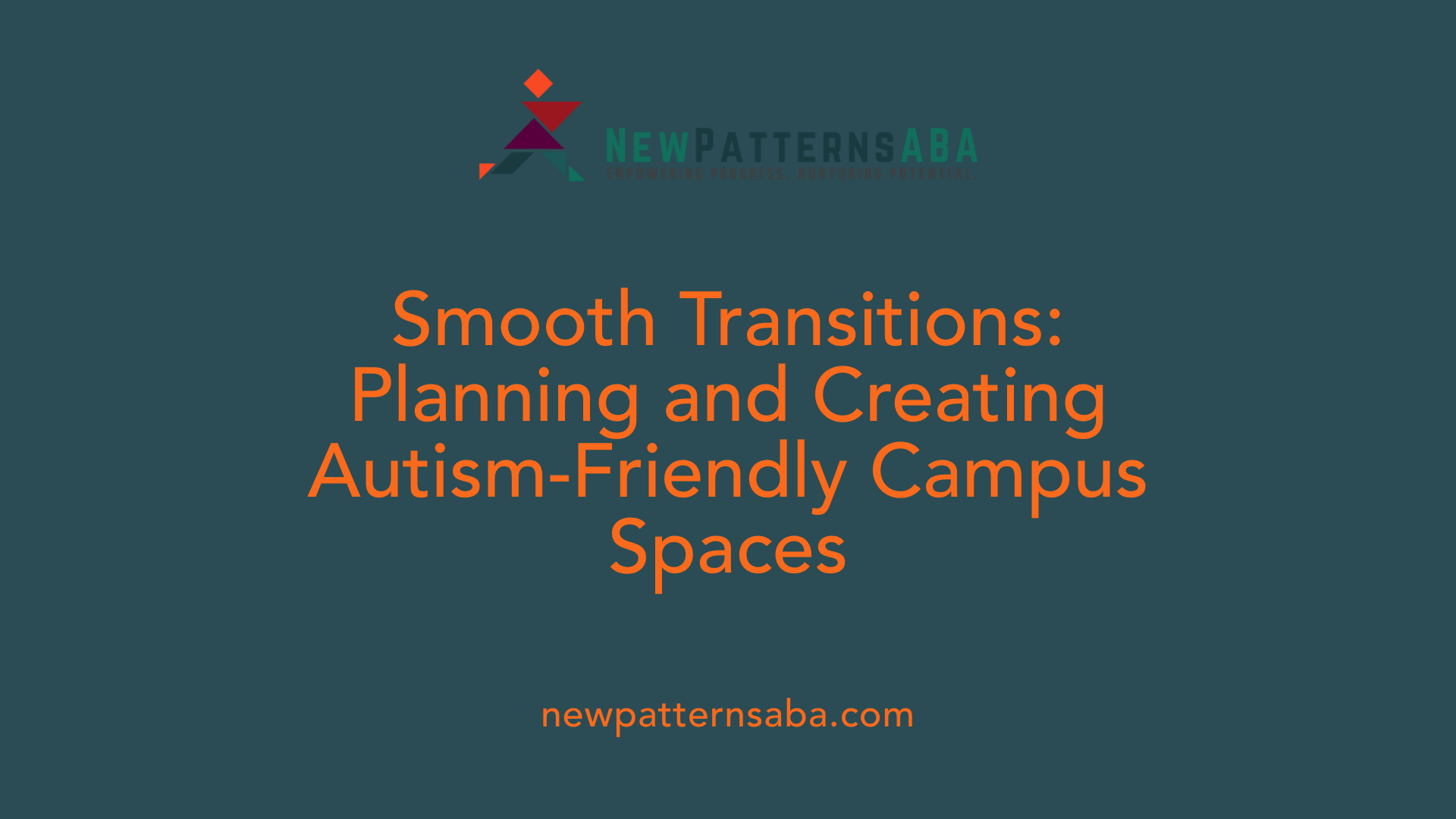
What considerations are important for transition planning for autistic individuals entering higher education?
Transitioning to college can be a complex process for autistic students, requiring careful planning and support. Starting the planning early—preferably around age 14 or even earlier—is crucial. Early preparation allows students to develop self-awareness, self-advocacy skills, and independence, all of which are vital in the new environment.
Involving a team of support professionals, including families, educators, and specialists like speech-language pathologists, helps create personalized transition plans. These plans should focus on building skills such as self-regulation, time management, and problem-solving. Visual schedules and organizational tools are effective for supporting executive functioning difficulties. Programs like STEPS (Supporting Transition and Emotional Processing Skills) emphasize evidence-based strategies to foster self-determination and emotional regulation.
Familiarization with campus resources and understanding legal rights are also essential steps. Knowledge about assistive technologies, academic accommodations, mental health services, and social supports enables students to navigate the college environment more confidently. Talking with disability services offices early on helps clarify the process for requesting accommodations.
Legal rights, such as protections under the Americans with Disabilities Act (ADA) and Section 504 of the Rehabilitation Act, ensure that students receive appropriate support. However, this often requires documentation of autism and specific needs. Students should learn how to disclose their diagnosis and request accommodations effectively.
In addition, participating in transitional programs offered by colleges and universities can ease the move. These programs often include campus tours, peer mentorships, skills workshops, and resource guides tailored for autistic students and their families.
Creating an environment conducive to autistic students’ success involves not only individual preparation but also campus-wide efforts to foster understanding and inclusion. This includes staff training on neurodiversity, developing sensory-friendly spaces, and providing explicit instructions and routines.
Involving staff in ongoing neurodiversity training ensures that faculty and support staff understand sensory sensitivities, communication preferences, and behavioral considerations. This promotes an inclusive atmosphere where autistic students feel valued and supported.
Overall, a proactive, collaborative approach to transition planning and campus environment adaptation can significantly enhance the college experience for autistic students, paving the way for academic achievement, personal growth, and social integration.
Building Autism-Friendly Campus Environments
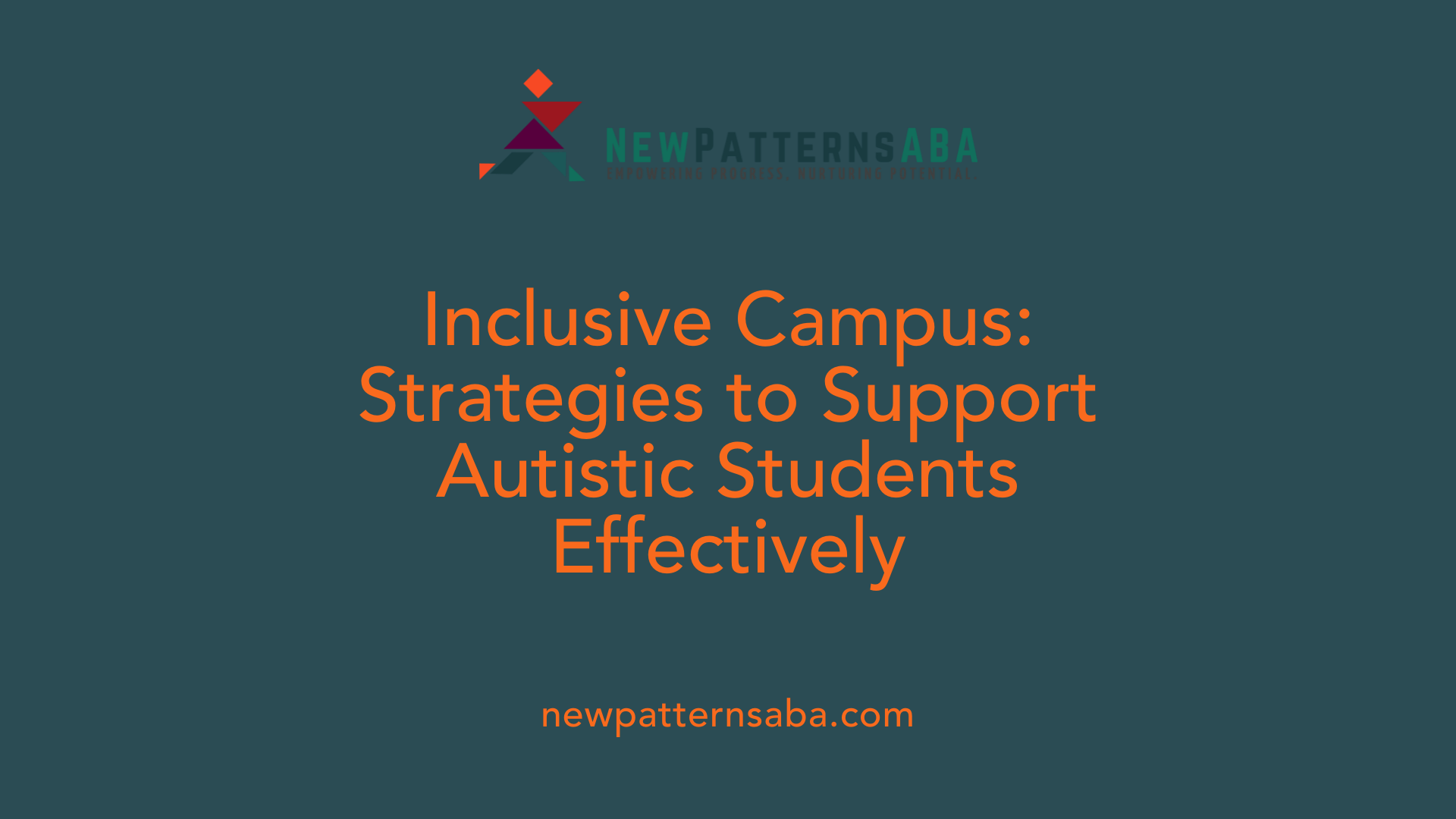
How can college environments be made more autism-friendly?
Creating more autism-friendly college environments involves implementing a variety of strategies designed to support autistic students’ unique needs. Central to these efforts are sensory accommodations that help manage sensory sensitivities common among autistic individuals.
Many campuses are now establishing sensory-friendly spaces such as quiet rooms or sensory pods. These spaces provide a safe haven where students can retreat when overwhelmed. Adjustments to lighting, reducing noise levels, and enabling the use of sensory tools like headphones, fidget devices, or weighted blankets can greatly ease sensory overload.
Alongside sensory adjustments, academic and social supports are crucial. Educational staff can be trained in neurodiversity awareness to better understand and assist autistic students. Implementing visual supports—such as schedules, signage, and clear instructions—helps students navigate the campus more confidently. Structured routines, like visual timetables and step-by-step guides, offer predictability and reduce anxiety related to transitions.
Effective communication strategies are also vital. Faculty and staff should use clear, explicit language and confirm understanding. Providing options for responses—like written communication or visual prompts—can make interactions smoother.
Beyond physical and academic accommodations, fostering an inclusive culture includes policy development and involving autistic voices in decision-making processes. Many institutions participate in initiatives like the College Autism Network’s “Autism-Inclusive Campus” designation, which offers a framework for holistically improving campus accessibility.
Promoting awareness through campaigns and peer support programs further nurtures an understanding environment. Peer mentorship and student-led advocacy groups serve as vital supports for social integration.
By combining sensory adaptations, structured routines, inclusive policies, and community involvement, colleges and universities can transform into environments where autistic students thrive academically, socially, and personally.
| Strategy | Implementation Examples | Benefits |
|---|---|---|
| Sensory accommodations | Quiet rooms, sensory tools, adjustable lighting | Reduce sensory overload, promote comfort |
| Structured routines | Visual schedules, clear instructions | Enhance predictability, reduce anxiety |
| Staff training | Neurodiversity workshops, inclusive teaching | Improve support quality, foster understanding |
| Inclusive policies | Student involvement, awareness campaigns | Create welcoming campus culture |
| Peer support | Mentoring programs, student groups | Enhance social belonging, mentorship |
Adopting these practices encourages a campus atmosphere that respects neurodiversity, supporting the success and well-being of autistic students.
Additional Resources and Search Tips
For those interested in further exploring ways to make college campuses more autism-friendly, effective search queries include:
- "Making college campuses autism-friendly"
- "Sensory accommodations in higher education"
- "Inclusive policies for neurodiversity in colleges"
These searches can lead to a wealth of guides, case studies, and policy frameworks that detail best practices and innovative approaches for fostering neurodiverse-friendly campuses.
Legal Frameworks and Institutional Policy for Supporting Autistic Students
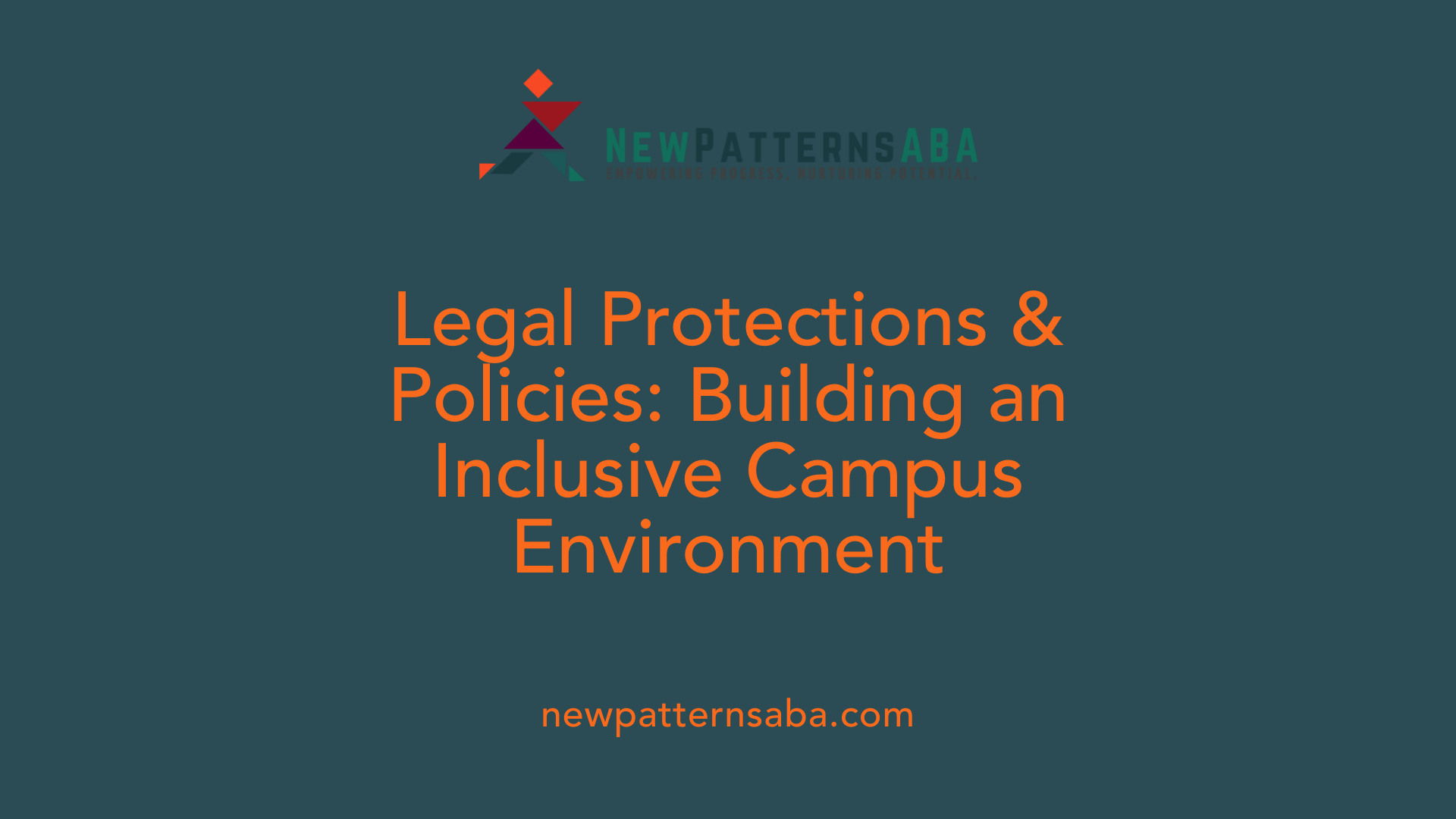
What policies, accommodations, and legal considerations exist for supporting autistic students in higher education?
Supporting autistic students in higher education involves implementing comprehensive policies and providing specific accommodations that uphold accessibility, promote inclusion, and prevent discrimination. Central to these efforts are legal mandates such as the Americans with Disabilities Act (ADA) and Section 504 of the Rehabilitation Act. These laws require colleges and universities to offer reasonable adjustments tailored to each student's needs, such as extended exam time, note-taking assistance, and sensory-friendly classroom environments.
Most institutions establish Disability Support Services (DSS) to coordinate accommodations and ensure an inclusive learning atmosphere. DSS assesses individual needs through documentation and collaborates with students to develop personalized support plans.
In addition to accommodations, institutions are encouraged to develop policies that promote awareness and understanding of autism, including staff training on specific support strategies. Such training prepares faculty and staff to communicate clearly, utilize visual supports, and foster an overall environment of respect and inclusivity.
Legal considerations also encompass safeguarding students' rights to nondiscriminatory access to education. Confidentiality of disability-related information must be maintained, and students should have access to formal procedures for dispute resolution when accommodations are denied or not implemented properly.
Creating an equitable academic environment requires ongoing commitment from an institution’s leadership. Laws and best practices continuously evolve, emphasizing the importance of regular policy reviews to adapt to new understanding and technological advances.
By aligning institutional policies with legal frameworks, colleges can better support autistic students in achieving academic success and transitioning smoothly into careers or independent living.
| Policy Area | Description | Implementation Examples |
|---|---|---|
| Legal Mandates | Affirm rights to accommodations under ADA and Section 504 | Regular training, legal compliance checks |
| Accessibility | Ensuring physical and digital environments are accessible | Sensory-friendly spaces, accessible online resources |
| Staff Training | Educating faculty and staff on autism and support strategies | Workshops, online modules |
| Confidentiality & Rights | Protecting students' privacy and procedural fairness | Clear confidentiality policies, dispute resolution |
This structured approach ensures that institutions not only meet legal requirements but also foster a genuinely inclusive and supportive environment for students on the autism spectrum.
Promoting Independence and Social Integration in College
How can colleges foster independence and social integration among autistic adults?
Colleges play a pivotal role in supporting autistic students as they navigate higher education and develop essential life skills. One effective approach involves implementing structured social activities. These include weekly meetings, peer mentoring programs, and interest-based groups that promote interaction and community engagement. Such initiatives have been shown to boost peer connections, reduce feelings of isolation, and enhance participation in campus events.
In addition to social programs, targeted skills training can significantly aid autistic students in achieving independence. Universities can offer workshops and courses that focus on daily living skills, self-awareness, and communication. Visual supports, checklists, and assistive technologies are valuable tools to make learning and practicing these skills more accessible. Emphasizing hands-on practice within real-world settings helps reinforce learning and build confidence.
Transition planning is essential for long-term success. Starting early in college and providing ongoing support allows students to develop organizational and executive functioning skills critical for managing coursework, personal responsibilities, and employment tasks. Dedicated advising, coaching, and mentoring can facilitate this growth.
A supportive campus environment that values inclusivity makes a difference. Creating an autism-friendly space with accessible resources, quiet zones, and social events tailored for autistic students encourages participation and feelings of belonging. Including opportunities for internships and employment, accompanied by adaptive supports like discreet prompts, can further foster professional development and social integration.
Incorporating these strategies can help autistic students achieve greater independence, develop meaningful social connections, and prepare for seamless transitions into employment and independent living.
Fostering a Supportive and Inclusive College Environment
Creating an autism-friendly college environment involves a comprehensive approach encompassing policy, environment, support services, and community engagement. Institutions that prioritize sensory-friendly spaces, staff training, personalized accommodations, and active involvement of autistic voices are better equipped to support the diverse needs of autistic students. As awareness and resources grow, colleges are becoming increasingly capable of fostering independence, social integration, and academic success, helping autistic adults transition smoothly into higher education and beyond, paving the way for fulfilling careers and lives.
References
- 5 Essential Tips for Autistic Adults in Higher Education
- Autism: A Guide for Further Education Institutes
- Supporting Autistic Adults in Postsecondary Settings
- Navigating College
- Navigating College Education for Young Adults with Autism
- Higher Education on the Spectrum
- Supporting Learning in Students with Autism: What Do ...
- Career Guidance for Autistic Students and Staff - Autism in ...





